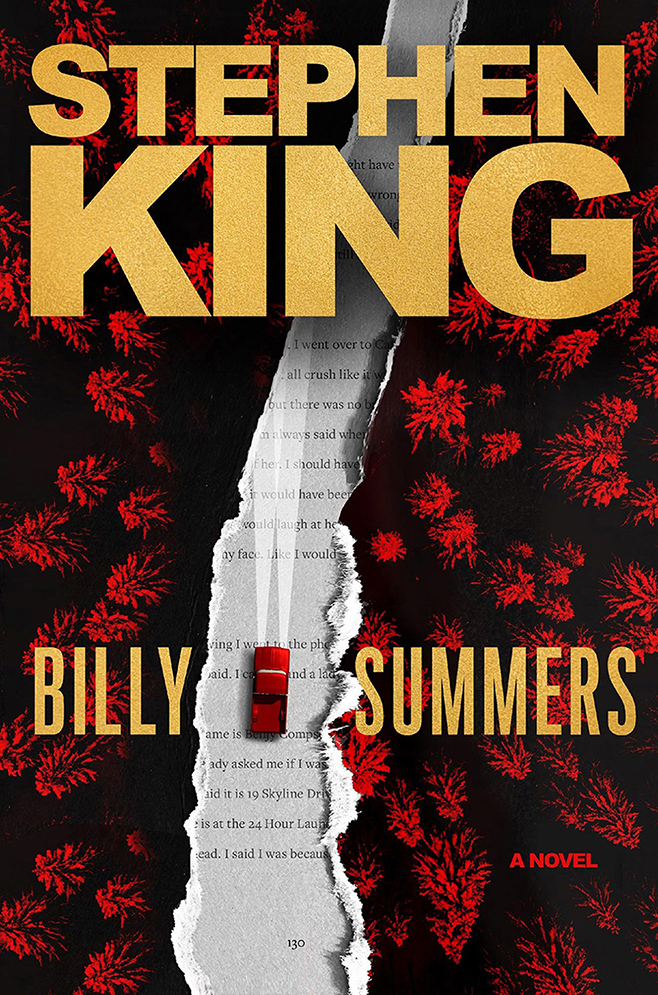Not to put too fine a point on it, but “Billy Summers” is the best Stephen King novel in a while. Let me tell you three reasons why I think so.
First, the plot, despite having basically two distinct halves, is pretty much seamless and has the irresistible forward motion that’s characteristic of just about every story Stephen King ever wrote. Billy Summers is an assassin who kills only, in his phrasing, bad guys. He doesn’t really like killing for money, but he’s good at it – he learned in the Marines to be a dead-eye long-range sniper – and it pays well.
What he hopes will be his last job is much more complicated than anything he’s done before. But it promises to pay much more as well. Billy and his mobster employers arrange for him to devise a new identity, rent houses and office space, and fit in with his neighbors and office building community while he waits for the extradition of a prisoner to Billy’s adopted town. Billy expects eventually to shoot the prisoner from his office window as the prisoner is being led up courthouse steps 500 yards away to face a murder charge. If all goes as planned, Billy will then use his notorious ability to disappear to, well, disappear. This is the anchoring situation for both halves of the story.
The second reason this is one of Stephen King’s best books involves the fascinating complexity of the characters, mainly Billy of course. King is always carefully attentive to the solidity of his characters; most of them, even minor ones, seem to live right in your living room. But Billy Summers is in a different order of literary reality. His past as an abused child, foster home kid, and Marine in Iraq is not just background, but makes up a subplot of its own whose events and motifs are integral to the main plot and themes. Moreover, Billy adopts deliberate personae – including “dumb Billy”; distinct personalities presented to his various neighbors; and physical disguises – that he enacts with Shakespearean attention to detail and speech. There are several main characters – all of them Billy.
These personae lead to the third thing that sets this book apart: its stylistic brilliance. The short, blunt sentences that make up most of the early chapters of the book directly evoke dumb Billy. The style of those sentences deftly shifts in other passages to evoke shrewd Billy. Adding another layer to this stylistic shapeshifting, Billy’s cover occupation while he waits for his mark to arrive is writer, so to pass the time in character, Billy starts writing his own autobiography, which is itself a riveting story.
At first Billy is careful to write in his dumb-self voice in case the mobsters are spying on his computer activities. As events unfold, he sheds dumb Billy’s voice and begins to develop a writing voice truer to his own thoughts and self, with subtle parallels to and departures from his speaking/dialogue voices. At several nodes in the narrative he explicitly considers his many voices, and a sense of complex metafiction (roughly, a kind of fiction in which a story talks about itself) emerges. When another character sees a distant mirage of the long-vanished Overlook Hotel of King’s 1977 novel “The Shining,” we feel like the themes of voice and personae are operating on a plane beyond the personal imagination of a single storyteller (Billy, or this other character, or the author himself). And not to give anything away, but the book’s ending launches us onto a completely different, expanded metafictional plane involving writing, writers, what’s written, and the nature of generational if not gender-ational written realities.
Part of the genius of this complexity is that it is enfolded seamlessly in a straight-on murder mystery. The narrative is devoid of what in the hands of an English professor could become a tangled thicket of postmodern philosophic discussion. Instead, the story’s various threads are absorbingly told from the point of view of, and in parts by, the no-nonsense hit man himself. The writer is a hit man.
I was blown away by this book. Maintaining a consistent voice across 500 pages is not within every writer’s range of capability, and Stephen King has been extremely good at it since the 1970s. But in “Billy Summers,” a variety of voices, sharply tuned to the personae of one character, are measured, developed and explored across a truly gripping adventure story.
The literati for their own trendy reasons praised King’s 2006 novel “Lisey’s Story,” which starts in elevated literary theme and style but partway through deteriorates into fairly typical King bloodthirsty madness. But “Billy Summers,” with a minimum of violence and gore, is a much more accomplished book. It’s one of Stephen King’s masterpieces.
Off Radar takes note of poetry and books with Maine connections the first and third Fridays of each month. Dana Wilde is a member of the National Book Critics Circle. Contact him at universe@dwildepress.net.
Comments are not available on this story.
Send questions/comments to the editors.



